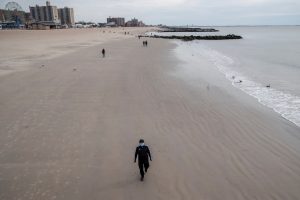 This morning I came across a brief article online about social distancing and its relation to Yoko Ogawa’s The Memory Police. Published at Slate, the article is titled “The Dystopian Novel for the Social Distancing Era,” and the author, a D.C.-based writer by the name of Joshua Keating, draws parallels between the permanent disappearances in Ogawa’s novel and the presumably temporary disappearances from our lives as a result of local, state, and national efforts to diminish the spread of the coronavirus. “Perhaps on the front lines in Wuhan, or Milan, or even Seattle,” he writes, “the coronavirus outbreak feels as nightmarish as Contagion, or Station Eleven. Perhaps it will feel that way where I live, in D.C., soon. For now, the outbreak feels more like The Memory Police—things disappearing from our lives before we can even process them.”
This morning I came across a brief article online about social distancing and its relation to Yoko Ogawa’s The Memory Police. Published at Slate, the article is titled “The Dystopian Novel for the Social Distancing Era,” and the author, a D.C.-based writer by the name of Joshua Keating, draws parallels between the permanent disappearances in Ogawa’s novel and the presumably temporary disappearances from our lives as a result of local, state, and national efforts to diminish the spread of the coronavirus. “Perhaps on the front lines in Wuhan, or Milan, or even Seattle,” he writes, “the coronavirus outbreak feels as nightmarish as Contagion, or Station Eleven. Perhaps it will feel that way where I live, in D.C., soon. For now, the outbreak feels more like The Memory Police—things disappearing from our lives before we can even process them.”
The article ends in this manner:
I support social distancing. I want to #flattenthecurve. I’ve read the terrifying accounts from Italy and Wuhan and I don’t value my afternoon coffee break or my dinner plans over anyone’s life. But I still worry about which of the things that disappeared this week are, like the objects in Ogawa’s novel, never going to reappear.
The Memory Police is a political novel as well, and I can’t stop thinking about that either. In the face of a terrifying threat, I see people who have spent the better part of the past three years fretting about the disappearance of democratic norms and civil liberties angrily demanding new restrictions on their lives. I understand why they’re doing it, but I hope they don’t undervalue, or even forget, the things that were so important just a few weeks ago.
It is, as Keating suggests, impossible from our current perspective to determine what might have been permanently lost as a result of the efforts to save lives from this virus, but for a clear, precise, and powerful discussion of what the consequences of our failure to take such actions might be, read this article from the New York Times: “The Virus Can Be Stopped, But Only With Harsh Steps, Experts Say.”
I’m interested in how Keating describes the dystopia of The Memory Police: “It’s a quiet dystopia of loss and confusion rather than repression, perhaps better suited for a world of misinformation and environmental degradation than the Big Brother nightmares of last century.” I hadn’t necessarily considered it in this light, but upon reading that statement, it makes sense, especially in relation to everything happening in the world right now even without the corona virus.
I’ve also been thinking about how things will change after the virus. I’ve seen lots of posts on social media with people wondering if and when we’ll go back to doing handshakes and high fives. Are these things that were so normal even just a few weeks ago now going to disappear? It’s certainly a strange thing to consider.
I agree, Raven. I was struck by that passage as well.
“Things disappearing from our lives before we can even process them” is definitely something that I’ve been thinking a lot about lately; today, the governor of Virginia announced that all public schools will be closed until the end of the school year, and I was talking with my father about how sad it is for all the seniors who won’t be able to partake in graduation or school traditions or any of the things they were looking forward to during their final year of school. There are so many things that I’ve been missing that, one month ago, I never would have even thought twice about, like being able to go for a drive with friends or heading into town to browse the thrift shops. Then, as Raven pointed out, there are things even smaller than that, like handshakes and high fives. It really is strange to think that you don’t even realize what you have until it’s gone.